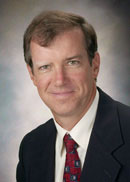Member of the Month: Mark Nadeau
Member of the Month: Mark Nadeau, MD
Residency director emphasizes flexibility of family medicine
posted 4.1.16
Mark Nadeau, MD, joined the Department of Family and Community Medicine at the University of Texas Health Science Center San Antonio in 2005 after serving 27 years as an Air Force Medical Corps officer. Since primary care is critical to the development of a high quality medical care system in our country, he has devoted most of his medical career to the education of residents and medical students. He has served as the program director for the family medicine residency at UTHSCSA for 10 years. His current clinical practice emphasizes medical care of underserved patients.

Why did you choose family medicine, and what’s your favorite aspect of it? Were you inspired by anyone?
As a medical student, I was drawn to the specialty by the variety of patients. Every day, we would see many new problems. It seemed challenging and exhilarating that I could master the breadth of knowledge required to be a family physician.
I have had many people who have inspired me during my career. My main sources of inspiration have been family, patients, and residents. I have been inspired by several mentors. I would recommend that all TAFP members seek out mentors and be willing to be a mentor if chosen by the learner.
- Two physicians who inspired me to become a strong clinician: Dr. Louis Barnett, Dr. David Richmond
- Two physicians who inspired me to develop myself as a teacher: Dr. Pete Krogh, Dr. Brian Reamy
- Two physicians who inspired me to develop myself as military physician: Dr. Sean Murphy, Dr. Whit Campbell
- Two physicians who inspired me to improve my leadership skills: Dr. Randy Randolph, Dr. Ruth Robinson
- Two physicians who inspired me to improve my strategic thinking: Dr. Carlos Jaen, Dr. Bob Ferrer
It is important for me to be a member of AAFP and TAFP because:
I have been a member of AAFP since 1982. Our Academy has consistently advocated for reforms that are in the best interests of our patients and our members. Your support of AAFP is important for the future of the specialty and for the future of health care in the U.S.
I highly encourage all family physicians to become involved with their state chapter of AAFP. I have been a member of TAFP for more than 10 years. Texas is a great place to be a family physician. There are many excellent residencies and practice opportunities. A strong state chapter like TAFP is an essential contributor to making Texas a great environment for family medicine. I was a member of the Uniformed Services Academy of Family Physicians from 1982-2005. As the state chapter equivalent for military family physicians, USAFP provides similarly high quality support for their members as does our TAFP. In my view, this support is only possible when there is a high level of involvement from the academy members.
What one word or phrase characterizes your style of family medicine?
“Hands on.” I have been an academic physician for much of my career, but nothing is more professionally satisfying and fun than talking and working with patients directly.
What is the biggest opportunity or challenge you see in the specialty in the next five years?
The biggest challenge for the specialty and for the health care system is to educate enough family physicians to ensure that all patients have access to high quality primary care. Other specialties that have the training to do primary care are moving away from this challenge to more limited practices. Texas needs more family medicine residency positions, so we will have more family physicians in the future.
What advice would you offer to medical students discerning their specialty?
I tell medical students that family physicians have a lot of flexibility in the type of practice that they create for themselves. The clinical skill set is broad, so physicians can develop a practice that fits the needs of their community and their own professional interests.
I also tell students that their training in family medicine will allow them a lot of professional flexibility. If there is ever a need to “reinvent yourself professionally,” the clinical skill set is a great foundation for learning new areas of medicine or for adapting to changing conditions in the market.
Tell me something fun (unrelated to medicine) about yourself.
I ran track in college, and I still love to work out. These days, I do less running. I really enjoy cycling and swimming. I can also cook a little bit, and I am learning Spanish.
If you weren’t a physician what would you be doing with your career right now?
My family members are all in business, so I suppose that I would have ended up working for a company or starting a business. From very early in my college career, I wanted to be a physician. I am sure that I would have continued to try to get into medical school for many years, if I had not been successful initially.
TAFP’s Member of the Month program highlights Texas family physicians in TAFP News Now and on the TAFP website. We feature a biography and a Q&A with a different TAFP member each month and his or her unique approach to family medicine. If you know an outstanding family physician colleague who you think should be featured as a Member of the Month or if you’d like to tell your own story, nominate yourself or your colleague by contacting TAFP by email at tafp@tafp.org or by phone at (512) 329-8666. View past Members of the Month here.